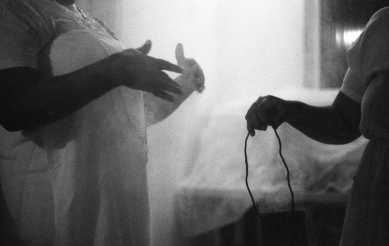
Lecture by Tao DuFour on his recently published book Husserl and Spatiality: A Phenomenological Ethnography of Space. The book deals with the phenomenology of space and embodiment based on the work of Edmund Husserl. Husserl's phenomenology of embodied spatiality, which is little known in architecture, laid the groundwork for the work of later phenomenologists, including the renowned phenomenology of perception by Maurice Merleau-Ponty. Through a detailed study of Husserl’s posthumously published and unpublished manuscripts on space, DuFour explores the depth and scope of his phenomenology of space. The book examines his analyses of bodily presence and the “lived body” and expands them to include questions of intersubjective, intergenerational, and geohistorical spatial experiences, which DuFour refers to as the “environmentality” of space. The book, which combines detailed architectural philosophical explorations of spatiality with rich and intimate ethnography, speaks to themes of social and cultural anthropology from a theoretical perspective that addresses spatial practice and experience. Based on field research in Brazil, DuFour develops his analyses of Husserl's phenomenology through spatial descriptions of rituals in the Afro-Brazilian religion Candomblé. The result is a new type of methodology and a unique way of spatial description that DuFour labels “phenomenological ethnography of space.” With a deeply interdisciplinary approach, the book is a penetrating contribution relevant for scholars and students of architecture and architectural theory, anthropology and material culture, as well as philosophy and environmental aesthetics.
Tao DuFour is an architect and spatial theorist. He is currently a visiting scholar at Clare Hall, University of Cambridge, and an assistant professor at the Cornell University School of Architecture. In his work, he addresses issues of embodied spatial experience, intersubjective and intergenerational understanding of architecture, landscapes, and territories, and the ways these realities shape the historicity of environments and how they are situated within them. He engages with the phenomenology of perception and embodiment, phenomenological descriptions of spatial experience, and their relationship to ethnographic descriptions of space. DuFour leads the Landscape and Urban Environmentalities Lab, an interdisciplinary research group that explores spatial and territorial relationships between cities and their surroundings, including climate and atmosphere, industrial and agricultural landscapes, infrastructure, green belts, and forests. The lab focuses on the issues of intersubjective and intergenerational environmental experiences and imaginations, employing geospatial mapping and drawing on literary and ethnographic sources and methods, including field research and the use of visual media such as photography and documentary film. DuFour’s current research focuses on the regional context of the Caribbean and Guiana. He earned his bachelor's degree from Cooper Union and obtained both his master's and doctoral degrees in the history and philosophy of architecture from the University of Cambridge. He is the author of the book Husserl and Spatiality: A Phenomenological Ethnography of Space (Routledge 2022) and the guest editor of the forthcoming special issue of the journal Future Anterior dedicated to the theme of “Space and Heritage.” DuFour is, along with Natalia Melas, the co-principal investigator of the “Possible Landscapes” project, a two-year research and documentary film project exploring environmental experience in the Caribbean with a focus on Trinidad and Tobago, funded by the Cornell Mellon Foundation Just Futures Initiative.
Tao DuFour is an architect and spatial theorist. He is currently a visiting scholar at Clare Hall, University of Cambridge, and an assistant professor at the Cornell University School of Architecture. In his work, he addresses issues of embodied spatial experience, intersubjective and intergenerational understanding of architecture, landscapes, and territories, and the ways these realities shape the historicity of environments and how they are situated within them. He engages with the phenomenology of perception and embodiment, phenomenological descriptions of spatial experience, and their relationship to ethnographic descriptions of space. DuFour leads the Landscape and Urban Environmentalities Lab, an interdisciplinary research group that explores spatial and territorial relationships between cities and their surroundings, including climate and atmosphere, industrial and agricultural landscapes, infrastructure, green belts, and forests. The lab focuses on the issues of intersubjective and intergenerational environmental experiences and imaginations, employing geospatial mapping and drawing on literary and ethnographic sources and methods, including field research and the use of visual media such as photography and documentary film. DuFour’s current research focuses on the regional context of the Caribbean and Guiana. He earned his bachelor's degree from Cooper Union and obtained both his master's and doctoral degrees in the history and philosophy of architecture from the University of Cambridge. He is the author of the book Husserl and Spatiality: A Phenomenological Ethnography of Space (Routledge 2022) and the guest editor of the forthcoming special issue of the journal Future Anterior dedicated to the theme of “Space and Heritage.” DuFour is, along with Natalia Melas, the co-principal investigator of the “Possible Landscapes” project, a two-year research and documentary film project exploring environmental experience in the Caribbean with a focus on Trinidad and Tobago, funded by the Cornell Mellon Foundation Just Futures Initiative.
The English translation is powered by AI tool. Switch to Czech to view the original text source.

0 comments
add comment
Related articles
0
02.02.2025 | Fosbury Architecture: +10 - lecture at the VI PER Gallery
0
23.04.2022 | Markéta Svobodová: Czechoslovak Students at the Bauhaus - Lecture at VI PER
0
22.08.2021 | Erika Henriksson: Making-with - lecture at Gallery VI PER
0
10.02.2020 | Monika Platzer: Cold War and Architecture - lecture at the VI PER gallery
0
29.11.2017 | Artist talk: Katarina Burin - lecture at the VI PER gallery
0
24.11.2017 | José Aragüez: The Building - lecture at the gallery VI PER









